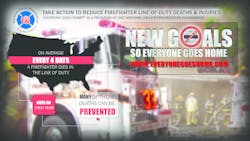Surviving More Than Just the Fireground: Fitness is Key, But it’s Also so Much More
Editor’s note: Discuss survivability, fitness and the NFFF’s New Goals initiative to reduce firefighter line-of-duty deaths to under 50 annually in the following Firehouse.com Forums:
- What’s the one aspect of personal health you find most challenging (e.g., eating right, getting enough exercise, getting the right amount of sleep, getting the needed medical screenings)?
- Would incumbent medical/fitness testing ever work in your department? Why/why not?
And find more information on the NFFF’s New Goals initiative at www.everyonegoeshome.com.
If you’re carrying around a few extra pounds, don’t think that you’re the only one who notices.
As a firefighter, every day is an opportunity to make an impact on the public and on our fellow firefighters. But that opportunity goes both ways. We all cringe when firefighters conduct themselves in ways that threaten our collective image—the rare cases of drinking alcohol or having sex in the station, abusing overtime policies or posting poorly thought-out comments on Facebook. But our physical fitness is rapidly becoming a factor for our reputations as well. Consider some recent headlines:
- Firefighter obesity a big problem
- Fatter FDNY recruits failing
- Ohio Firefighters Who Don't Exercise May Face Discipline
- Obesity a big problem for U.S. firefighters
In many places around the country, fire departments and individual firefighters are battling to maintain or repair their image and restore public trust. Photos and articles that illustrate how as a group we’re overweight, out of shape and engaging in unhealthy behaviors like smoking and drinking alcohol in excess will certainly not help that effort.
Of course, the first and foremost reason we should stay physically active, eat healthy, limit alcohol use and avoid tobacco use is to reduce our chances of having a cardiovascular event while at the same time increasing our career/life longevity. In a recent study, 20 to 30 percent of firefighters were found to have hypertension and heart disease, which was cited as an “underlying factor” in nearly all victims of line-of-duty cardiovascular incidents.
But the headlines above point to another reason to stay fit: If we want the public to support taxes that fund our departments and cancer presumption legislation that will help us if we do succumb to occupational hazards, we need to do our part too.
Lasting Benefit
The good news is that the effort we expend now to achieve and maintain optimal fitness will continue to pay off, in some cases long after we’ve left the fire service. Although officers and chiefs can serve well past their 50s, many firefighters will retire from the job with some of their best years still ahead of them. Paying attention to your fitness and health throughout your firefighting career can be the difference between a retirement that’s spent dealing with old injuries and occupational cancer, or a retirement that’s active and satisfying.
- More: NFFF New Goals
Some exposure to risk is the nature of the job, but there are many things we can do to limit that exposure. Maintaining good fitness cuts down on back, neck and shoulder injuries. Comprehensive health screenings and understanding our genetic predispositions can help us address problems before they occur. Cleaning our PPE, using wet wipes and hot showers as soon as possible after fires, and wearing SCBA until atmospheric monitoring supports an all-clear can reduce our cancer risk. These actions all take effort—but they also work.
The bottom line: Fitness is an area where we can take individual action to improve our survivability. We need to get and stay physically active, participate in annual medical exams and fitness testing, and get our weight under control. If, when you look ahead to retirement, you imagine a second career, travel or even just spending time with the grandkids, staying fit and protecting your health now is critical.
Taking Action
Recently I argued that it’s time for the fire service to move beyond the “low-hanging fruit” and face the difficult, but necessary, challenge of enforcing an annual physical fitness standard. I still wholeheartedly believe that. But we can’t sit around and wait for that to happen. Each of us also has an individual responsibility to take action to improve and maintain our health and fitness. It’s the key to survivability—and to dramatically reducing the number of us who die in the line of duty each year.
TIMOTHY E. SENDELBACH is the Editor-in-Chief for Firehouse. A 29-year student and educator of the fire and emergency services, he is responsible for the content and editorial direction of Firehouse® Magazine, Firehouse.com, Firehouse Expo, Firehouse World and related products. He has served as an assistant fire chief with the North Las Vegas, NV, Fire Department, as the chief of training for Savannah, GA, Fire & Emergency Services and as assistant fire chief for Missouri City, TX, Fire & Rescue Services. He is a credentialed Chief Fire Officer and Chief Training Officer and has earned a master’s degree in leadership from Bellevue University, bachelor’s degrees in fire administration and arson and an associate’s degree in emergency medical care from Eastern Kentucky University. You can e-mail him at [email protected].
